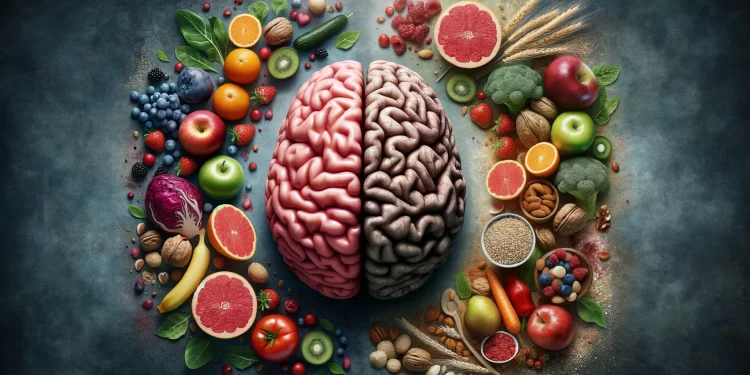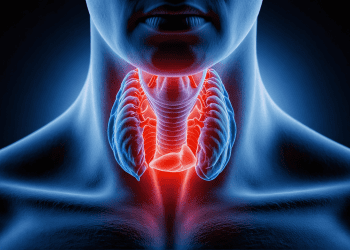Did you know that what you eat can have a profound impact on your mental health and well-being? It’s true! Research has shown that the food we consume plays a significant role in our mood and overall mental health. Adopting a balanced diet full of nutritious foods can lead to improved well-being and a positive mindset.

When it comes to promoting mental health through diet, it’s not just about counting calories or following the latest fad. It’s about nourishing your mind with the right nutrients and maintaining a balanced and healthy eating routine. So, let’s dive deeper into the fascinating relationship between food and mental health, and discover how you can optimize your diet for a happier and healthier mind.
Key Takeaways:
- What you eat can have a significant impact on your mental health and well-being.
- Adopting a balanced and nutritious diet can improve your mood and overall mental health.
- Nourishing your mind with the right nutrients is essential for optimal mental well-being.
- A healthy eating routine can contribute to a happier and healthier mind.
- Stay tuned to learn more about the fascinating connection between food and mental health!
How are food and mental health linked?
Research has uncovered a strong connection between food and mental health. The food we eat plays a crucial role in influencing our emotional and psychological well-being. Consuming a nutritious diet can have a positive impact on our mental health, while an unhealthy diet can have detrimental effects on our mood and overall mental well-being.
Studies have consistently shown the relationship between food and mental health. When we eat well, we tend to feel better emotionally. This is because certain foods contain nutrients that support the production of neurotransmitters, such as serotonin, dopamine, and norepinephrine. These neurotransmitters play a key role in regulating our mood and emotions.
On the other hand, a diet that lacks essential nutrients can lead to imbalances in these neurotransmitters, impacting our emotional state. Moreover, consuming high amounts of processed and sugary foods can contribute to inflammation in the body, including the brain, which can further exacerbate mood disorders such as depression and anxiety.
By being mindful of our diet and making conscious choices to eat nutritious foods, we can support our mental health and well-being. The next section will explore what foods we should be incorporating into our diet for optimal mental well-being.
| Nutrient | Food Sources |
|---|---|
| Omega-3 Fatty Acids | Fatty fish (salmon, mackerel), walnuts, chia seeds |
| B Vitamins | Whole grains, legumes, leafy green vegetables |
| Antioxidants | Colorful fruits and vegetables (berries, spinach, kale) |
| Probiotics | Yogurt, kefir, sauerkraut |
| Complex Carbohydrates | Whole grains, sweet potatoes, quinoa |
Incorporating these nutrient-rich foods into our diet can provide the building blocks necessary for optimal brain function and support our mental health. Additionally, it is important to maintain a balanced diet that includes lean proteins, fiber, and healthy fats.
Seeing as diet has such a significant impact on our mental health, it’s important to be mindful of the foods we eat. In the next section, we will explore what specific foods should be included in a well-balanced diet to support our mental well-being.
What should I eat?
When it comes to promoting mental health through diet, it is important to focus on eating a balanced and varied diet. A well-rounded and nutritious diet can have a positive impact on our mental well-being. Here are some guidelines for incorporating healthy foods into your diet:
Incorporate Healthy Fats
Include sources of healthy fats such as olive oil, avocados, and nuts in your meals. These fats are essential for brain health and can contribute to a balanced diet.
Choose Whole Grains
Opt for whole grains like quinoa, brown rice, and whole wheat bread instead of refined grains. Whole grains provide essential nutrients and can help stabilize blood sugar levels, promoting mental clarity and focus.
Fill Up on Fruits and Vegetables
Make sure to include a variety of fruits and vegetables in your diet. These colorful foods are packed with vitamins, minerals, and antioxidants that support brain function and overall health.
Adequate Protein
Ensure that you are consuming enough protein from sources like lean meats, fish, legumes, and dairy products. Protein is necessary for the production of neurotransmitters that regulate mood and cognition.
Promote Gut Health
Caring for your gut health is crucial for overall well-being, including mental health. Incorporate probiotic-rich foods like yogurt and fermented vegetables into your diet to support a healthy gut microbiome.
Moderate Caffeine Intake
While caffeine can provide a temporary energy boost, excessive consumption can negatively impact mental health. It is important to consume caffeine in moderation and be mindful of its effects on your well-being.
By following these guidelines and prioritizing a balanced diet, you can nourish your body and support your mental health.

| Food Group | Examples |
|---|---|
| Healthy Fats | Olive oil, avocados, nuts |
| Whole Grains | Quinoa, brown rice, whole wheat bread |
| Fruits and Vegetables | Apples, spinach, carrots |
| Protein | Chicken breast, salmon, lentils |
| Probiotic-rich Foods | Yogurt, sauerkraut, kimchi |
| Caffeine | Coffee, tea (in moderation) |
Sharing meals with other people
Eating meals with others not only satisfies our physical hunger but also nourishes our mental well-being. The act of sharing a meal with friends, family, or even colleagues can have a profound impact on our psychological, social, and biological well-being.
Psychological benefits
The shared experience of enjoying a meal with others can bring us a sense of joy and happiness. It provides a space for relaxation and enjoyment, allowing us to escape daily stressors and immerse ourselves in positive interactions. Sharing a meal also offers an opportunity for reflection and conversation, allowing us to connect deeply with others and strengthen our relationships.
Social benefits
Eating meals together fosters social connection and a sense of belonging. It creates a space for bonding, where we can engage in meaningful conversations and build deeper relationships. In a world where digital interactions can dominate our lives, sharing meals with others offers a valuable opportunity to connect face-to-face and cultivate genuine connections.
Biological benefits
Surprisingly, there are also biological benefits associated with shared meals. Eating in an upright position aids digestion by allowing food to move through the digestive system more easily. Additionally, the act of talking and listening while eating slows down our eating pace, promoting mindful eating and better digestion. This can contribute to better nutrient absorption and overall gut health.
So, whether it’s a cozy family dinner or a fun gathering with friends, make it a habit to share meals with others. Not only will you enjoy delicious food, but you’ll also reap the psychological, social, and biological benefits that come with the shared experience.
Eating disorders
It is crucial to be aware of the presence of eating disorders, as they can have a profound impact on mental health. Eating disorders stem from negative coping mechanisms and often manifest as a way to deal with emotional pain or exert control over one’s life.
Those with eating disorders may turn to food as a means to numb or escape emotional turmoil. This unhealthy relationship with food becomes a coping mechanism, offering temporary relief from emotional distress. However, these behaviors can intensify emotional pain and perpetuate a cycle of negative thoughts and behaviors.
Control plays a significant role in eating disorders. By exerting control over what and how much they eat, individuals feel a sense of power and autonomy. However, this control is ultimately a double-edged sword, as it leads to damaging physical and psychological consequences.
To overcome eating disorders and promote mental wellness, seeking professional help is crucial. A healthcare professional specializing in eating disorders can provide guidance, therapy, and support tailored to the individual’s needs. This comprehensive approach helps address the underlying emotional pain and develop healthier coping mechanisms.
Supportive friends and family also play a vital role in the recovery process. Encouraging open communication, empathy, and understanding creates a safe environment for individuals to express their struggles without fear of judgment.
Remember, eating disorders are severe conditions that require professional intervention. If you or someone you know is struggling with an eating disorder, reach out for help. There are resources available to guide you on the path to recovery and renewed mental well-being.
Signs and Symptoms of Eating Disorders
- Significant changes in weight, either weight loss or weight gain
- Obsession with body image and appearance
- Preoccupation with food, calories, and dieting
- Avoidance of social activities involving food
- Extreme dieting, restrictive eating patterns, or excessive exercise
- Feeling guilty or ashamed about eating
- Frequent trips to the bathroom after eating
- Mood swings, irritability, or depression
- Physical signs such as thinning hair, dry skin, or brittle nails

| Eating Disorder Type | Common Characteristics |
|---|---|
| Anorexia Nervosa | Severe restriction of food intake, intense fear of gaining weight or becoming fat, distorted body image |
| Bulimia Nervosa | Eating large amounts of food followed by compensatory behaviors such as purging or excessive exercise |
| Binge Eating Disorder | Recurrent episodes of overeating without compensatory behaviors, feelings of loss of control during binges |
| Other Specified Feeding or Eating Disorder (OSFED) | Eating disorder symptoms that do not meet the full criteria for anorexia, bulimia, or binge eating disorder |
Other ways I can take care of my mental health
In addition to maintaining a healthy diet, there are other aspects of mental health care that are essential for overall well-being. Incorporating physical activity, spending time in nature, avoiding cigarettes and alcohol, and developing good sleep habits can significantly impact mental health and promote a positive mindset.
Physical Activity
Engaging in regular physical activity is not only beneficial for our physical health but also plays a crucial role in supporting our mental well-being. Exercise stimulates the release of endorphins, which are natural mood enhancers, and can help reduce stress, anxiety, and symptoms of depression. Whether it’s going for a brisk walk, practicing yoga, or participating in team sports, finding activities that you enjoy and that get your body moving is key.
Connecting with Nature
Spending time outdoors and connecting with nature has been shown to have numerous mental health benefits. Being in natural environments can reduce stress, improve mood, and enhance cognitive function. Whether it’s taking a hike in the mountains, enjoying a picnic in the park, or simply sitting by a lake, immersing yourself in nature can have a calming and rejuvenating effect on your mind.
Avoiding Cigarettes and Alcohol
While it may seem obvious, it’s worth emphasizing that avoiding or minimizing the use of cigarettes and alcohol is crucial for maintaining good mental health. Smoking and excessive alcohol consumption can negatively affect mood, increase anxiety, and contribute to the development of mental health disorders. Making conscious choices to avoid these substances can have a positive impact on your overall well-being.
Developing Healthy Sleep Habits
Sleep plays a vital role in maintaining mental health. Poor sleep habits or lack of sleep can significantly impact mood, cognitive function, and overall well-being. Establishing a regular sleep routine, practicing relaxation techniques before bed, and creating a comfortable sleep environment are all essential for promoting restful sleep. Prioritizing and investing in quality sleep can have profound effects on your mental health and daily functioning.
| Physical Activity | Nature Connection | Avoidance of Cigarettes and Alcohol | Healthy Sleep Habits |
|---|---|---|---|
| Stimulates the release of mood-enhancing endorphins | Reduces stress and improves mood | Minimizes negative impact on mental health | Enhances cognitive function and overall well-being |
| Reduces symptoms of anxiety and depression | Enhances cognitive function | Promotes better sleep quality | Improves mood and daily functioning |
| Improves overall physical health | Provides a sense of calm and rejuvenation | Reduces the risk of mental health disorders | Supports emotional well-being |

Stress and Depression
Stress and depression can have a profound impact on our mental health. When we’re overwhelmed with stress or experiencing feelings of sadness and hopelessness, it’s important to be mindful of our diet as it plays a significant role in our overall well-being.
Processed foods, which are typically high in refined sugars, unhealthy fats, and artificial additives, can exacerbate stress and depression. These foods can trigger inflammation in the body and brain, which is linked to mood disorders. To support our mental health during these challenging times, it’s crucial to opt for nutrient-rich whole foods instead.
Whole foods, such as fruits, vegetables, lean proteins, whole grains, and healthy fats, provide essential nutrients that nourish our bodies and promote mental well-being. These foods can help reduce inflammation and provide the necessary building blocks for a healthy brain and nervous system.
The Impact of Processed Foods on Stress and Depression
Processed foods, while convenient and tempting, often lack the nutritional value our bodies need. These foods can cause blood sugar spikes and crashes, leading to mood swings and increased feelings of stress. Additionally, the additives and preservatives found in processed foods can disrupt the balance of chemicals in our brain, further impacting our mood and mental health.
In contrast, whole foods provide a more stable and sustained release of energy. They promote a stable blood sugar level, which can help stabilize mood and reduce feelings of stress. Incorporating whole foods into our diet can provide the necessary nutrients to support our body’s stress response and improve our overall mental well-being.

Choosing Nutrient-Rich, Whole Foods
Opting for nutrient-rich, whole foods is key to supporting our mental health during times of stress and depression. Here are some examples of whole foods that can help nourish our bodies and promote a positive mindset:
- Fruits and vegetables: Packed with vitamins, minerals, and antioxidants that support brain health and reduce inflammation.
- Lean proteins: Essential for neurotransmitter production and maintaining stable energy levels.
- Whole grains: Provide a steady release of energy and contain nutrients that support brain function.
- Healthy fats: Found in foods like avocados, nuts, and fatty fish, these fats are crucial for brain health and reducing inflammation.
- Probiotics: Support a healthy gut, which is linked to improved mood and mental health.
By prioritizing nutrient-rich, whole foods in our diet, we can take an important step towards supporting our mental health and managing stress and depression.
A Healthy Gut
The connection between the gut and the brain is a strong one. A healthy gut not only plays a crucial role in digestion but also influences emotional behavior and mental health. The brain-gut connection is mediated by the production of neurochemicals, such as serotonin, which directly affects mood and well-being.
Stress is a significant factor that can impact gut health. When we are stressed, our digestion may become compromised, leading to imbalances in the gut microbiota. This disruption can negatively affect mood and mental health. Therefore, it is important to manage stress levels to support a healthy gut.
One way to maintain a healthy gut is through proper nutrition. Consuming a balanced diet that includes fiber-rich foods like fruits, vegetables, and whole grains can promote a diverse and thriving gut microbiota. Probiotic-rich foods, such as yogurt and fermented vegetables, can also contribute to a healthy gut.
The Role of Neurochemicals in Gut Health
Neurochemicals, including serotonin, are neurotransmitters that communicate between the gut and the brain. Serotonin is often referred to as the “happy hormone” because of its role in regulating mood. It is estimated that around 95% of serotonin production occurs in the gut.
A healthy gut with a balanced microbiota can support the production of serotonin, promoting positive mood and mental well-being. On the other hand, an imbalanced gut microbiota can lead to reduced serotonin levels and increased risk of mood disorders.
Understanding the Impact of Food on Mental Health: A Focus on Blood Glucose and Diabetes
The intricate relationship between our diet and mental health cannot be overstated, particularly when considering the roles of blood glucose and insulin in our body. The regulation of glucose level (a term often used to denote normal or optimal blood sugar levels) is crucial for maintaining both physical and mental well-being.
At the heart of this regulation is insulin, a hormone that plays a key role in controlling our blood sugar levels. When we consume food, particularly those high in carbohydrates, our body breaks it down into glucose, which is a primary energy source. Insulin helps our cells absorb this glucose, thereby regulating our blood glucose levels.
However, when the body’s ability to produce or respond to insulin is impaired, it leads to a condition known as diabetes. This chronic condition can have a profound impact on mental health. Fluctuating blood sugar levels can affect the brain, potentially leading to mood swings, anxiety, and even depression in some individuals.
Another important factor to consider is the glycemic index (GI) of the foods we eat. The GI measures how quickly a food causes our blood sugar levels to rise. Foods with a high GI, such as white bread or sugary snacks, cause a rapid spike in blood sugar, followed by a sharp drop. This rollercoaster of blood glucose levels can affect mood and energy, exacerbating symptoms in those with mental health conditions. On the other hand, low GI foods, like whole grains and most fruits, provide a more gradual release of glucose into the bloodstream, leading to more stable blood sugar levels and, consequently, mood.
By understanding and managing these aspects – from maintaining optimal glucose levels to choosing foods with a lower glycemic index – we can better support our mental health through diet. This is particularly vital for individuals managing conditions like diabetes, where blood glucose control is essential not just for physical health, but for mental well-being too.

The Role of Hydration and Medication in Mental Wellbeing
While discussing the impact of food on mental health, it’s crucial to highlight the importance of hydration. The intake of fluids plays a pivotal role in maintaining mental wellbeing. Just as our body requires a balance of nutrients, adequate hydration is essential for optimal brain function. Dehydration can lead to confusion, irritability, and an overall decline in cognitive function, which in turn can exacerbate mental health problems.
Water, herbal teas, and other hydrating beverages are key components of a diet that supports mental health. They assist in maintaining the balance of fluids in the brain, which is necessary for neurotransmitter production and function. These neurotransmitters are the chemicals that communicate information throughout our brain and body, and their imbalance can lead to various mental health issues.
On another note, when discussing diet and mental health, we must consider the role of mental health drugs. These medications, prescribed for various mental health conditions, can have interactions with certain foods and nutrients. For instance, some antidepressants may interact with foods high in tyramine, leading to adverse effects. It’s important for individuals on mental health medication to have a clear understanding of how their diet can affect their medication efficacy and vice versa.
Moreover, some mental health drugs can impact appetite and weight, which further emphasizes the importance of a balanced diet. Healthcare professionals often recommend a diet rich in fruits, vegetables, whole grains, and lean proteins to counteract these side effects, thereby supporting overall physical health, which is intrinsically linked to mental wellbeing.
Maintaining proper hydration and being mindful of the interactions between diet and mental health medication are key components in managing mental health problems. A comprehensive approach that includes both diet and appropriate medical treatment can significantly contribute to improved mental wellbeing.
Enhancing Psychological Health with Omega Fatty Acids and Nutrient-Dense Drinks
A critical yet often overlooked aspect of diet in supporting psychological health involves the balance of omega fatty acids in our meals. The roles of omega-3 and omega-6 fatty acids are vital in maintaining brain health and function. Omega-3s, found in foods like fatty fish, flaxseeds, and walnuts, are known for their anti-inflammatory properties and their positive impact on brain function. They play a crucial role in cognitive processes and emotional health. On the other hand, while omega-6 fatty acids are also essential, an imbalance with a higher intake of omega-6s (common in many Western diets) as opposed to omega-3s can lead to inflammation and may negatively impact psychological health.
Incorporating a balance of these fats is crucial for optimal brain health and the prevention of mood disorders. Striving for a diet that includes a variety of sources of omega-3s can make a significant difference in enhancing psychological health.
Another enjoyable and beneficial addition to a diet aimed at supporting mental health is the inclusion of juices and smoothies. These beverages can be a delightful and easy way to consume a range of nutrients essential for brain health. For instance, smoothies made with berries, spinach, and a source of omega-3s like flaxseed oil can provide a brain-boosting mix of antioxidants, vitamins, and healthy fats. Similarly, fresh juices can be a great source of vitamins and minerals. However, it’s important to be mindful of the sugar content in juices and to focus on those made predominantly from vegetables with a little fruit to add sweetness.
Consuming juices and smoothies made with a variety of fruits, vegetables, and added sources of omega-3s can be a delicious and efficient way to support psychological health. They can contribute significantly to a diet that promotes mental wellbeing, complementing other aspects of a healthy lifestyle.
Stress and Gut Health
Stress can have a profound impact on gut health. When we experience chronic stress, our body releases stress hormones that can disrupt the balance of bacteria in the gut. This imbalance can contribute to symptoms such as bloating, indigestion, and even gastrointestinal disorders.
To support a healthy gut in times of stress, it is important to prioritize self-care and stress management techniques. Engaging in activities like meditation, exercise, and spending time in nature can help reduce stress levels and support a healthy gut.

Foods for a Healthy Gut
| Food Group | Examples |
|---|---|
| Fiber-rich foods | Fruits (e.g., berries, apples), vegetables (e.g., broccoli, spinach), whole grains (e.g., quinoa, oats) |
| Probiotic-rich foods | Yogurt, kefir, sauerkraut, kimchi |
| Healthy fats | Avocado, olive oil, nuts, seeds |
By incorporating these foods into our diet and adopting stress-reducing habits, we can support a healthy gut and improve our overall mental well-being. Taking care of our gut health is a key component of maintaining a balanced and healthy mind.
Mindful Eating
When it comes to our eating habits, being mindful can play a significant role in our overall well-being. Mindful eating involves paying attention to how we feel when we eat and being aware of our eating habits. By practicing mindful eating, we can develop a healthier relationship with food and better understand the signals our body sends us.
One way to cultivate mindful eating is by keeping a food journal. This involves recording what we eat, when we eat, and how we feel before and after meals. By tracking our food choices and emotional state, we can identify patterns and emotional triggers associated with overeating or undereating. Keeping a food journal can be a powerful tool for gaining insight into our eating habits and making positive changes.
In addition to keeping a food journal, creating a relaxed eating environment can promote mindful eating. Taking the time to enjoy meals without distractions allows us to focus on the sensory experience of eating. By savoring each bite, we can fully appreciate the flavors and textures of our food, and become more attuned to feelings of hunger and fullness.
Practicing mindful eating can help break the cycle of emotional eating. Emotional eating occurs when we turn to food for comfort or as a coping mechanism for stress, sadness, or boredom. By being mindful of our emotions and understanding our triggers, we can develop alternative strategies for dealing with these feelings without relying on food.
By bringing awareness to our eating habits, practicing mindful eating can lead to a more balanced relationship with food and a healthier approach to nourishing our bodies and minds.
Key Tactics for Mindful Eating:
- Keep a food journal to track eating habits and emotions.
- Create a relaxed eating environment without distractions.
- Savor each bite and be attentive to hunger and fullness cues.
- Identify emotional triggers and develop alternative coping strategies.
Mindful Eating vs. Emotional Eating
| Mindful Eating | Emotional Eating |
|---|---|
| Focuses on physical and emotional cues | Relies on external triggers and emotions |
| Values nourishing the body and mind | Seeks comfort or distraction from emotions |
| Takes time to savor and enjoy meals | Eats quickly and mindlessly |
| Encourages self-awareness and self-care | Uses food as a coping mechanism |
Brain Food
The brain and nervous system require proper nutrition to function effectively. Including a variety of complex carbohydrates, lean proteins, and fatty acids in our diet can support optimal brain function. Foods like brown rice, lean meats, fish, and nuts are all beneficial for brain health.
Healthy Eating Tips for Food and Mental Health
To maintain a healthy diet for mental health, it is important to prioritize nutritious choices and adopt mindful eating habits. Here are some tips to help you on your journey to a healthier mind and body.
Avoid Processed Snacks
Processed snacks are often high in unhealthy fats, added sugars, and artificial ingredients. These can negatively impact your mood and overall well-being. Instead, opt for healthier alternatives such as fresh fruits, raw nuts, or homemade snacks. These options provide essential nutrients and can keep you satisfied throughout the day.

Choose Healthy Fats
Incorporating healthy fats into your diet is essential for brain health and overall well-being. Foods like olive oil, avocados, and fatty fish are rich in omega-3 fatty acids, which are known to support cognitive function and improve mood. Including these healthy fats in your meals can help nourish your mind and body.
Opt for Healthy Snacks
When it comes to snacking, choose options that provide sustained energy and essential nutrients. Some healthy snack ideas include:
- Fresh fruits and vegetables
- Greek yogurt or cottage cheese
- Hard-boiled eggs
- Nuts and seeds
- Whole grain crackers or rice cakes
These snacks are rich in vitamins, minerals, and fiber, making them a great choice to support mental well-being.
Mindful Shopping and Eating
Practicing mindful shopping and eating habits can help you make healthier choices and develop a positive relationship with food. Here are some tips to incorporate mindfulness into your eating routine:
- Create a shopping list before going to the grocery store to avoid impulse purchases of unhealthy snacks.
- Read food labels to make informed choices and avoid foods high in sugars, unhealthy fats, and artificial additives.
- Eat without distractions, such as watching TV or using electronic devices, to fully savor and enjoy your meals.
- Chew your food slowly and pay attention to the flavors and textures, savoring each bite.
A Balanced Approach
Remember, healthy eating is not about strict diets or deprivation. It’s about nourishing your body and mind with balanced, nutritious choices. By implementing these tips and embracing mindful eating, you can support your mental health and overall well-being.
| Processed Snacks | Healthy Fats | Healthy Snacks | Mindful Shopping and Eating |
|---|---|---|---|
| Avoid processed snacks high in unhealthy fats, added sugars, and artificial ingredients. | Incorporate healthy fats like olive oil, avocados, and fatty fish into your meals. | Choose fresh fruits, Greek yogurt, nuts, and whole grain snacks for sustained energy. | Create a shopping list, read food labels, eat without distractions, and savor each bite. |
The Interplay of Food and Mental Health: Insights from Renowned Organizations
In the realm of mental health, the significance of nutrition is increasingly recognized. This is exemplified by the collaborative efforts of prominent organizations like the American Psychiatric Association (APA) and the American Society for Nutrition (ASN). These institutions have shed light on the bidirectional relationship between diet and mental health, emphasizing how our eating habits can influence psychological well-being, and vice versa.
The APA, in collaboration with the ASN, conducted a survey revealing a growing public awareness of the link between food and mental health. A majority of the participants acknowledged their understanding of this relationship and expressed willingness to modify their diets to enhance mental well-being. This aligns with emerging research that underscores the mental health benefits of healthy diets, such as the Mediterranean Diet, known for its positive impact on psychological health.
Furthermore, the APA’s Clinical Practice Guidelines offer a wealth of information on various mental health conditions and treatment approaches. These guidelines are formulated based on extensive research and provide evidence-based recommendations for healthcare professionals. They play a crucial role in shaping clinical decisions and improving patient care in the field of psychiatry.
The World Health Organization (WHO) also recognizes the impact of mental health disorders like depression on global health and disability. Understanding and managing these conditions remains a significant public health challenge, with ongoing research continuing to explore the intricate relationship between food and mental health.
For more in-depth information, you can visit the American Psychiatric Association’s website and explore their resources on food and mental health, as well as their Clinical Practice Guidelines. Additionally, the American Society for Nutrition’s website offers further insights into the role of diet in mental well-being.
Final Thoughts
The connection between food and mental health is undeniable. Research consistently shows that adopting a balanced and nutritious diet can have a positive impact on our well-being and mood. By making mindful food choices, sharing meals with others, and seeking professional help when necessary, we can nourish our minds and support our mental health.
When it comes to promoting mental health through diet, it is important to focus on eating a balanced and varied diet. Incorporating healthy fats like olive oil and nuts, whole grains, plenty of fruits and vegetables, and adequate protein can contribute to improved mental well-being. Taking care of gut health by consuming probiotics and avoiding excessive caffeine can also be beneficial.
In addition to maintaining a healthy diet, there are other ways to promote mental well-being. Staying physically active, spending time in nature, avoiding cigarettes and alcohol, and developing good sleep habits are all important aspects of taking care of one’s mental health.
It is important to be aware of the presence of eating disorders, as they can greatly impact mental health. Using food as a negative coping mechanism to deal with emotional pain or to exert control over one’s life can be signs of an eating disorder. Seeking professional help and support is crucial for managing and overcoming these disorders.
FAQ
How are diet and mental health linked?
Research has shown that the food we consume can influence our emotional and psychological well-being. A nutritious diet can improve mental well-being, while an unhealthy diet can negatively impact our mood and overall mental health.
What should I eat?
It is important to focus on eating a balanced and varied diet. This includes incorporating healthy fats like olive oil and nuts, whole grains, plenty of fruits and vegetables, and adequate protein. Taking care of gut health by consuming probiotics and avoiding excessive caffeine can also be beneficial for mental well-being.
How are sharing meals with other people beneficial?
Sharing meals with others has numerous benefits for mental health. It provides a sense of rhythm and regularity in our lives, fosters social connection, and offers opportunities for reflection and conversation. Additionally, eating in an upright position aids digestion, and the act of talking and listening slows down our eating pace.
What should I know about eating disorders?
Using food as a negative coping mechanism or to exert control over one’s life can be signs of an eating disorder. Seeking professional help and support is crucial for managing and overcoming these disorders.
What are other ways I can take care of my mental health?
In addition to maintaining a healthy diet, staying physically active, spending time in nature, avoiding cigarettes and alcohol, and developing good sleep habits are all important aspects of taking care of one’s mental health.
How does stress and depression relate to diet?
An inadequate diet, particularly one high in processed foods, can exacerbate stress and depression. These foods can lead to inflammation in the body and brain, contributing to mood disorders. Opting for nutrient-rich, whole foods can help manage stress and support a healthy mood.
How does gut health impact mental well-being?
The gut and the brain are strongly connected. Gut health can influence emotional behavior and play a role in the production of mood-regulating neurochemicals such as serotonin. Stress can also affect gut health, underscoring the importance of maintaining a healthy gut through proper nutrition.
What is mindful eating?
Mindful eating involves paying attention to how we feel when we eat and being aware of our eating habits. Keeping a food journal can help identify emotional triggers associated with overeating or undereating. Taking time to eat in a relaxed environment, without distractions, can also promote mindful eating.
Are there specific foods that benefit brain health?
Including a variety of complex carbohydrates, lean proteins, and fatty acids in our diet can support optimal brain function. Foods like brown rice, lean meats, fish, and nuts are all beneficial for brain health.
What are some tips for maintaining a healthy diet?
To maintain a healthy diet for mental health, it is important to avoid processed snacks and opt for healthy fats like olive oil and avocado. Choosing nutritious snacks like fruits, nuts, and hard-boiled eggs can provide sustained energy. Mindful shopping and eating habits, such as avoiding impulse purchases and eating without distractions, can also contribute to a healthy eating routine.
How important is the connection between food and mental health?
The connection between food and mental health is undeniable. Research consistently shows that adopting a balanced and nutritious diet can have a positive impact on our well-being and mood. By making mindful food choices, sharing meals with others, and seeking professional help when necessary, we can nourish our minds and support our mental health.












